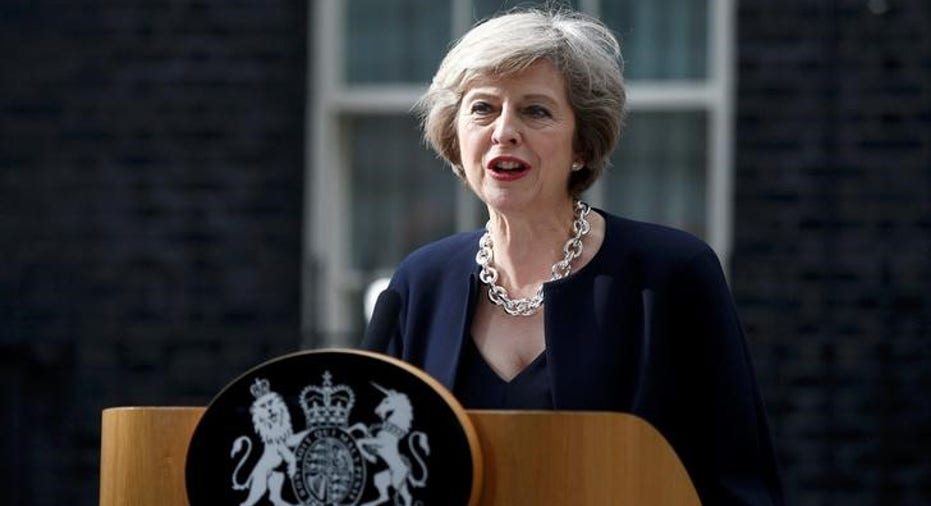Theresa May Faces Tricky Balancing Act in Talking Trade With Trump

When Prime Minister Theresa May meets President Donald Trump in the Oval Office on Friday, she will carry out a balancing act: She must try to lay the groundwork for a trade deal and avoid antagonizing European leaders with whom she must negotiate Brexit.
Mrs. May and Mr. Trump are expected to discuss a variety of subjects on which they differ, including the Iran deal, which Mr. Trump rejects, and the North Atlantic Treaty Organization, which he has called obsolete.
But stark differences on trade stand out. Mr. Trump has pushed an "America First" policy of protectionism and decried multilateral trade deals. Mrs. May has promoted her vision of Britain as the biggest proponent of free trade.
Mrs. May said in Parliament on Wednesday that she is "not afraid to speak frankly to a president of the United States." Speaking to reporters on a flight to Philadelphia, where she addressed Republican lawmakers on Thursday, she said she would have an opportunity to "talk to him face to face about the issues, about the interests that we share, about the special relationship, about the challenges that we both face."
When asked about whether she thought she would get along with Mr. Trump, Mrs. May, who tends to be understated, said: "Sometimes opposites attract."
Mr. Trump has talked up the possibility of a trade deal with Britain, the world's fifth-largest economy in 2015, as part of his wider strategy to reorder American economic alliances overseas.
Mrs. May is looking for further commitments to a deal, as she seeks to show her plan to leave the EU's single market -- which could mean new barriers to trade between Britain and the bloc -- won't hurt and may even enhance British prosperity.
"Theresa May needs early wins to create confidence that her Brexit policy is one that is going to work," said Tony Travers, politics professor at the London School of Economics.
But if she appears to be cozying up to Mr. Trump, who has dismissed the benefits of the bloc and praised June's Brexit vote, Mrs. May risks aggravating EU leaders, some of whom are facing populist backlashes of their own.
Her leeway to discuss a deal also remains constrained by EU rules that forbid member states to formally negotiate or ratify bilateral pacts -- a prohibition Britain must observe until it officially leaves, now targeted for March 2019.
The U.K. has been testing the limits of the EU's rule on trade deals for months, with Mrs. May's trade chief, Liam Fox, crisscrossing the globe to "scope out" possible future accords with old allies such as Australia as well as faster-growing markets in Asia and the Middle East.
EU officials in Brussels have voiced their displeasure. On Monday, a spokesman reiterated European Commission President Jean-Claude Juncker's complaint in September about EU members trying to negotiate free-trade agreements on their own.
The risk the British are running, some analysts say, is that European officials become irritated by London's courtship of other deals. That could sour coming talks over the U.K.'s divorce and future ties to the EU.
"There's a risk that if she goes too far down this route [of seeking trade deals] it just creates a toxic atmosphere," said John Springford, director of research at the Centre for European Reform, a London-based think tank that is pro-EU but advocates its overhaul.
The U.K. says it respect its obligations while it remains in the EU, and Mrs. May has also argued for the strengthening of the bloc.
The U.S. is a much more important export destination for the U.K. than vice versa, a dynamic that gives the U.S. the upper hand.
After the EU, where nearly half of British exports go, the U.S. is the U.K.'s biggest overseas market.
A fifth of British exports of goods and services, some $124 billion in 2015, went to the U.S. Around half were services, including financial and business services, telecommunications and travel. Americans also bought British-made drugs, electrical equipment and machinery.
A deal might make sense for Mr. Trump. An agreement would demonstrate that his strategy of moving away from the multilateral trade approach favored by former President Barack Obama is delivering results, said Shanker Singham, chairman of the special trade commission at the Legatum Institute, a London-based think tank.
On Monday, Mr. Trump formally pulled the U.S. out of the Trans-Pacific Partnership, the 12-nation trade agreement negotiated by Barack Obama and championed by businesses.



















